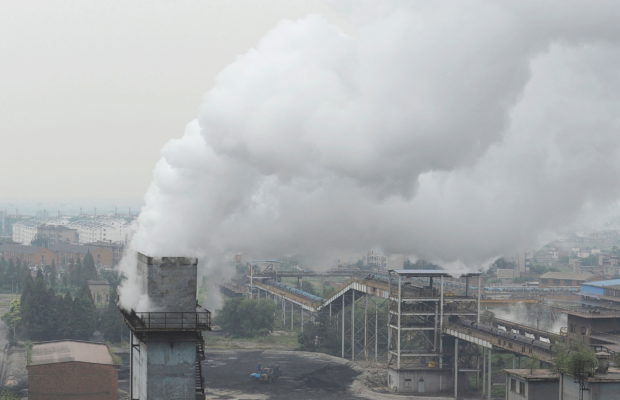
FILE PHOTO: Smoke billows from a chimney at a coking factory in Hefei, Anhui province October 2, 2010. REUTERS/Stringer/File Photo
MANILA, Philippines — The Philippines is pushing for a regional information exchange on climate action, pitched to be overseen by the Manila-based Asian Development Bank (ADB).
In a statement on Sunday, the Department of Finance (DOF) said Finance Secretary Carlos Dominguez III, who is President Duterte’s chair-designate at the Climate Change Commission (CCC), recently urged the ADB to “spearhead an Asean-wide initiative that would enable member-countries of the regional organization to exchange information and best practices on localized climate adaptation and mitigation programs.”
“Climate change might be a global problem. The issue, however, exhibits itself most starkly in our smallest communities. I am sure that the ADB will be ready to help us promote the exchange of climate change action and adaptation practices among the Asean countries,” Dominguez said last June 3 when the Philippine government and the ADB had an exchange of documents for two loan agreements.
One of the ADB’s two newest loans for its host-country was the $250-million financing for the Philippines’ climate change action program (sub-program 1) — the bank’s first-of-its-kind climate policy-based loan, making the country among the pioneers in climate-related development financing.
Dominguez said his proposal for an intra-Asean climate information exchange was “a better option than relying solely on international fora such as the annual United Nations (UN) Climate Change Conference of the Parties (COP) which focuses on the big picture in tackling the climate crisis, and usually overlooks solutions tailor-fit for local communities.”
Following his attendance at last year’s COP26 in Glasgow, the UK, Dominguez had lamented that rich and industrialized countries who have been polluting the planet more remained slow in fulfilling their climate finance commitments to ease the burden from developing nations like the Philippines.
One of the countries considered to be the most vulnerable to climate change, the Philippines had ambitiously pledged to slash greenhouse gas emissions by 75 percent by 2030 under the Paris Agreement.
Besides the ADB lending, the Philippines also tapped a separate 150-million euro loan, extended by the French government’s aid arm Agence Française de Développement (AFD), for its climate change action program.
“This initiative will hopefully encourage other countries to design and accelerate the implementation of their own climate programs. This sends a very strong signal to the international community that the Philippines is fully committed to deliver on our climate ambitions. We hope to inspire other emerging economies not only with our determination but also with innovative financial systems,” Dominguez said.
“We owe it to the Filipino people to build the nation’s resilience against climate change. We cannot wait for the industrial economies to break their inertia and accept the urgency of reducing greenhouse gas emissions and providing climate finance to vulnerable countries. We share only one planet. The whole world must act as one before global warming becomes a tsunami we can no longer push back,” according to Dominguez.
Dominguez had been telling foreign investors that the Philippines wanted to raise climate resiliency funds on its own partly through “green bonds” as developed countries have yet to fulfill their financing commitments to support poorer nations during their clean energy transition under the Paris Agreement. Last April, the Philippines raised 70.1 billion yen from a four-tranched, yen-denominated green samurai bonds offering, on top of its maiden green bonds foray in March through which $1-billion worth were borrowed in the offshore debt market.
The Philippines’ sustainable finance framework launched last year aimed to raise green, social or sustainability bonds and loans, among other debt instruments, in international capital markets to borrow funds for programs and projects geared towards fighting climate change and promoting inclusive growth.
National Treasurer Rosalia de Leon earlier told the Inquirer that the sustainable finance framework spans an eligible portfolio amounting to P989 billion.
Proceeds from sustainable financing instruments can finance social expenditures such as education and healthcare for the poor, people with disabilities (PWDs) and unemployed; basic infrastructure in rural areas; food security for farmers and disadvantaged populations; support to micro, small and medium enterprises (MSMEs); job creation; social assistance like conditional and unconditional cash transfers; as well as low-cost and socialized housing.
Green expenditures were also eligible from sustainable fund-raising, including projects promoting clean infrastructure, climate change adaptation, renewable energy, and environmentally sustainable management of living natural resources and land use.